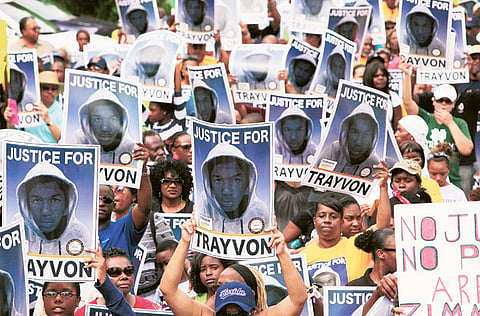Racial profiling: America's shame
It's not enough to punish Martin's killer; only a campaign to change archaic laws, institutions and society will end discrimination permanently

The tragic reality of the Trayvon Martin case is not unique but universal; it was not unusual, but typical. Racial profiling is all too common in the US, and has led to the killing of a young man.
Martin was simply walking from the 7/11 store to his father's home in the gated community of Sanford, Florida. For this, "walking while black", he was profiled, chased in the dark night, confronted by an unknown aggressor, shot and killed.
His pursuer, George Zimmerman, immediately targeted him as a potential criminal, "reporting" to a police dispatcher: "This guy looks like he's up to no good, or he's on drugs or something ... they always get away."
Zimmerman pursued Martin, apparently intent that this "criminal" would not get away. He told dispatchers that Martin had something in his hand and was coming after him — it turned out to be the candy and soda that Martin had just bought at the 7/11 store. And despite being told by police officers not to continue his chase, Zimmerman shot the unarmed young man at point-blank range.
Just two weeks ago in Chicago a young black woman was shot and killed by police. And a month earlier there was an even more shocking case in the city. Stephon Watts, a 15-year-old with autism, was having a rage episode, and his parents called the police. By the time officers arrived the boy had calmed down. Despite this, they shot and killed him — again, at point-black range.
Is it any wonder so many in the US and around the world have responded with disbelief, with anger, with outrage to Martin's death? Another black youth has fallen victim to racial profiling, and the killer is walking away free. The facts are clear: we know who the perpetrator was and who the victim.
Shoddy investigation
Yet police authorities accepted Zimmerman's account of the killing — and proceeded to investigate the victim instead. It harks back to the case of Emmett Till, the young black man whose killers walked free in 1955; or the murder of the civil rights leader Medgar Evers, whose killers were not prosecuted for 30 years.
So many basic police procedures were not followed with Martin. They apparently did not even tape off the area around the altercation — a basic requirement to secure a crime scene and gather forensic evidence. Nor did they attempt to identify and locate the victim's family: it took days before his parents discovered their child's fate and could take him out of the morgue.
Police did no tests or investigation of the killer, even though Zimmerman has a documented history of violence — in 2005 there was an alleged domestic violence incident and a physical encounter with police officers. But they did do tests on the victim, Martin.
In the first few days the local media didn't even report the killing. The main reason the world now knows about Martin is that his story was blogged by local activists and tweeted, going viral on the internet.
If Americans are to rectify this wrong, they need to move beyond simply calling for Zimmerman to be put behind bars. After all, when Rosa Parks was ejected from her seat, Americans didn't just focus on the bus driver. That campaign went from the bus company to the state of Alabama to Washington. America had to change the law. Change institutions. Change society. Americans now need to embark on a similar journey.
Deep rot
In the US, racial profiling is everywhere. The police profile us, the judges profile us, and the banks profile us. Black and Latino people were targeted, steered and clustered into sub-prime mortgage loans, and have been the principal victims of the foreclosure crisis.
The media often likes to present a veneer of success: we have top athletes, musicians, a screenful of actors, business people — and, above all, a president. But beneath that veneer black people are three times more likely to be unemployed than whites; and our infant mortality is higher, our life expectancy shorter, our imprisonment greater and our homicides higher than for any other ethnic group.
We need a new inquiry along the lines of the 1960s Kerner commission, which can provide a detailed annual assessment of the state of race relations in the US, looking at all the data on social justice — health care, employment, education etc — to see how we are fulfilling the obligations we set ourselves in the civil rights era.
Those who have claimed that, with President Barack Obama's election, we have moved to a post-racial society, are both inaccurate and naive. They've used convenient examples and anecdotes to say things are all well. But the Martin case has illuminated the darkness and exposed the inequalities.
We now need a public airing of the facts to show the real situation, to work out the required remedies, and to finally break the cycle of poverty and despair.
Let us take a moment to grieve for Martin, whose life was so brutally taken. Then let us move from moment to movement, and revive the struggle for a more perfect union. That would be a fitting legacy for Martin.
— Guardian News & Media Ltd
Jesse Jackson is an African-American civil rights activist and Baptist minister.


